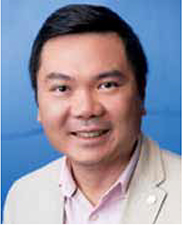Great leadership during uncertain times
 |
| Dr Matthew Chow |
22 January 2021
It has now been a year since the COVID-19 pandemic reached our shores. During these uncertain times, we have seen firsthand how skillful leadership is more important than ever. And while there have been volumes written on what constitutes great leadership, the following three traits seem to be common to some of our most capable, effective, and trustworthy leaders.
Great leaders are great listeners. Listening seems to be a lost art at a time when everyone is blasting away with 280 characters or less. Listening takes time, focus, and intention. It means stopping to make sure what has been said has been heard and understood. Unfortunately, listening is one of the first casualties in a crisis, yet it is critical to successful leadership. There are some obvious advantages to listening, such as gaining important perspectives and becoming aware of emerging risks, but I think there is another reason why listening is so important. People do not want to follow people who don’t listen. It’s a fundamental human need to be heard. Great leaders know this. They take listening as seriously as any other skill, meaning they put in the time to become better listeners, they practise constantly, and they measure their progress.
While being great listeners, great leaders also know how to tune out noise. During a crisis, everything is urgent, and everything and everyone demands immediate attention, but as the saying goes, “when everything is a priority, nothing is.” Noise seems to be particularly prevalent these days on social media. I was challenged to do an experiment where I significantly curtailed my consumption of social media for 2 weeks. Not only did I gain back time for self-care, I was no less informed about the issues that were important to me. I needed only 15 to 20 minutes per day to scan through the viewpoints of credible people, then I could get on with my life. I did have a good chuckle at some of the flame wars between people with contrary views, but it was liberating to not be involved. My little experiment also revealed how much social media warps people and complex issues into oversimplified caricatures—great for eliciting a highly charged emotional response but not conducive to effective debate. I often wonder how much more progress people would make if they sent each other a discrete direct message or fired up a video chat rather than exchanging volleys over Twitter.
Great leaders also show that they care about the people they lead. There are many ways to do this, as we have seen during the pandemic. Some leaders show their care through expressions of raw emotion, which break through their calm exterior—a little anger, a few tears, a departure from their speaking notes. Others demonstrate care through service, such as pinch hitting when staffing is short or volunteering for an undesirable task. And then there are those who express their care by how they address people, responding with respect when it would be easier to be dismissive, meeting anger with compassion, treating others as they would want to be treated. All this presumes that a leader cares about the people they are leading. Even children can tell the difference between someone who genuinely cares for them and someone who merely says they do. Great leaders genuinely care and they take pains to show it.
Anyone can learn and practise great listening skills, tune out the noise, demonstrate care for others, and become a great leader. Granted, it’s more challenging to accomplish these days. The COVID-19 restrictions have limited the opportunities for face-to-face interaction that is so critical for thoughtful debate and effective leadership. The restrictions have made it difficult for leaders to listen, to avoid distraction, and to demonstrate genuine care when they are limited to news releases, emailed communications, and brief townhalls. And they have made it difficult for those who follow to stay engaged and connected. But we can overcome this by having more leaders who are closer to the people they serve and who can demonstrate these important traits. I have seen this in doctors stepping up in their communities to listen to their neighbors, filter through all the conflicting medical information, and show they care. Some of the most effective leaders I have seen have no formal title, they simply saw a gap and filled it.
When I think about the challenges this next stretch of the pandemic will bring, I’m aware that now more than ever we need more people to step up as leaders. We need to overcome a continuous onslaught of noise and outright misinformation. We need to convince more people to follow public health directions, even as high-risk and vulnerable people become protected by vaccination. We need to combat prejudice and tribalism that still rears its head despite our vigilance. And, we need to take care of each other by listening to one another, by freeing ourselves from the distractions that take us away from what’s important, and by showing that we care.
—Matthew C. Chow, MD
Doctors of BC President

